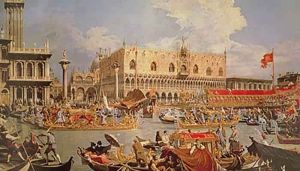Modern Era

Modern Era, also known as the contemporary period, spans from the 19th century to the present day. This era is characterized by rapid advancements in science, technology, economy, and society. The Modern Era has brought about transformative changes in human life, reshaping the way we work, communicate, and understand the world. This article explores the detailed characteristics, significant achievements, and pressing challenges of the Modern Era.
Characteristics of the Modern Era[edit | edit source]
Industrialization and Urbanization[edit | edit source]
The Modern Era commenced with the Industrial Revolution, a period of major industrialization that began in the late 18th century and continued into the 19th century. Key characteristics include:
- Mechanization of Production: The introduction of machinery in manufacturing processes, such as the steam engine and spinning jenny, revolutionized production, making it faster and more efficient.
- Urban Growth: Industrialization led to the rapid expansion of cities as people moved from rural areas to urban centers in search of employment, resulting in significant urbanization.
- Transportation Innovations: The development of railroads, steamships, and later automobiles and airplanes facilitated faster movement of goods and people, shrinking distances and connecting markets.
Scientific and Technological Advancements[edit | edit source]
The Modern Era is marked by groundbreaking scientific and technological progress that has profoundly impacted various aspects of life:
- Electricity and Communication: The harnessing of electricity and inventions such as the telegraph, telephone, radio, and eventually the internet transformed communication, making it instantaneous and global.
- Medical Progress: Advances in medicine, such as the development of vaccines, antibiotics, and medical imaging technologies, have significantly improved healthcare and increased life expectancy.
- Information Technology: The advent of computers and digital technology has revolutionized industries, leading to the information age and the rise of a knowledge-based economy.
Economic Growth and Globalization[edit | edit source]
Economic growth and globalization are defining features of the Modern Era:
- Economic Expansion: The era has witnessed unprecedented economic growth, driven by industrialization, technological innovation, and increased productivity.
- Global Trade and Investment: The liberalization of trade and investment has interconnected economies worldwide, leading to the rise of multinational corporations and global supply chains.
- Cultural Exchange: Globalization has facilitated cultural exchange, allowing people to share ideas, traditions, and innovations across borders.
Achievements of the Modern Era[edit | edit source]
Scientific Discoveries and Innovations[edit | edit source]
- Electricity and Electronics: The discovery and application of electricity have transformed everyday life, powering homes, industries, and communication systems.
- Space Exploration: Achievements in space exploration, such as the Apollo moon landings, the deployment of satellites, and the International Space Station, have expanded our understanding of the universe.
- Biotechnology: Advances in biotechnology, including genetic engineering and CRISPR technology, have opened new possibilities in medicine, agriculture, and environmental conservation.
Economic and Social Development[edit | edit source]
- Education and Knowledge: Education has become more accessible, with significant investments in primary, secondary, and higher education. The proliferation of digital resources has democratized access to knowledge.
- Human Rights and Democracy: The Modern Era has seen the expansion of democratic governance and the promotion of human rights. Movements for civil rights, gender equality, and social justice have made significant strides.
- Cultural and Artistic Movements: The era has witnessed the flourishing of diverse cultural and artistic movements, from modernism to postmodernism, reflecting the complexity and dynamism of contemporary society.
Challenges of the Modern Era[edit | edit source]
Climate Change and Environmental Degradation[edit | edit source]
Climate change is one of the most pressing challenges of the Modern Era:
- Global Warming: The increase in greenhouse gas emissions due to industrial activities and deforestation has led to global warming, resulting in rising temperatures and sea levels.
- Environmental Pollution: Industrialization and urbanization have contributed to air, water, and soil pollution, impacting human health and ecosystems.
- Biodiversity Loss: Habitat destruction and climate change are leading to the loss of biodiversity, threatening the balance of ecosystems.
Economic and Social Inequality[edit | edit source]
Despite economic growth, inequality remains a significant issue:
- Income Disparities: There are vast disparities in income and wealth distribution, both within and between countries.
- Access to Resources: Inequitable access to resources such as education, healthcare, and technology exacerbates social and economic divides.
- Labor Market Changes: The transition to a digital economy and automation has created challenges for workers, including job displacement and the need for new skills.
Security and Geopolitical Tensions[edit | edit source]
The Modern Era is also characterized by security challenges and geopolitical tensions:
- Conflict and Terrorism: Ongoing conflicts and the threat of terrorism pose risks to global stability and security.
- Cybersecurity: The rise of cyber threats and attacks on critical infrastructure highlight the need for robust cybersecurity measures.
- Geopolitical Rivalries: Competition for resources, influence, and power continues to shape international relations, leading to geopolitical rivalries and tensions.
Conclusion[edit | edit source]
The Modern Era is a period of remarkable progress and profound transformation, marked by significant achievements in science, technology, economy, and society. However, it also presents complex challenges that require collective action and innovative solutions. By fostering scientific advancement, technological innovation, and international cooperation, humanity can navigate the challenges of the Modern Era and work towards a sustainable and prosperous future for all.